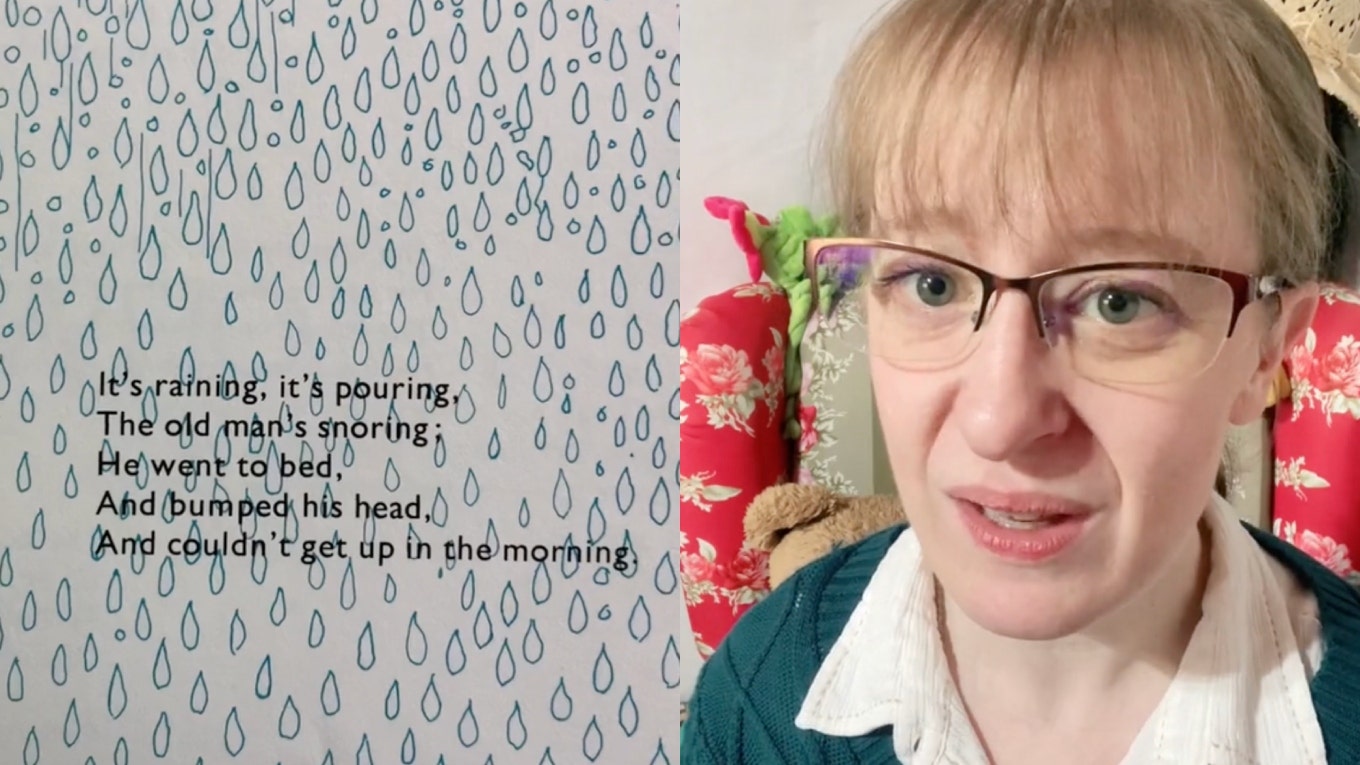Teacher Explains The 'Dark' Meaning Behind The Popular Nursery Rhyme 'It's Raining, It's Pouring, The Old Man Is Snoring'
Who knew nursery rhymes are actually ominous warnings?
 @stupidlittlegenius / TikTok
@stupidlittlegenius / TikTok Chances are, most of us have at least once in our childhood sung the classic nursery rhyme "It's Raining, It's Pouring." But what many people don't know is that it has really dark and grim undertones.
A teacher on TikTok named Jane, more commonly known as "Stupid Little Genius," has recently shed light on the surprising meaning behind this seemingly innocent tune.
She explained the true meaning behind the popular nursery rhyme 'It's raining, it's pouring, the old man is snoring.'
Jane is an English woman who shares her knowledge about nursery rhymes and their history on her popular TikTok account. She recently posted a rather dark interpretation of this well-known verse.
She suggests that beneath its catchy rhythm lies a cautionary tale about excessive drinking leading to fatal consequences.
She began by reciting the familiar lines before delving into an unnerving analysis of what those words hint at. "It's raining, it's pouring, the old man is snoring. He went to bed and bumped his head and couldn't get up in the morning," she sang.
She explained that the person in the story is not supposed to be a particular person. "Although it doesn't describe any specific person, it does tell us a cautionary tale," she added.
Contrary to what one might initially think, this rhyme apparently has little to do with weather patterns. "In actual fact, 'the old man' liked a good drink," she said.
The phrases "it's raining" and "it's pouring," according to Jane's interpretation, metaphorically refer not to a downpour but rather to alcoholic beverages being liberally poured — as if it were raining cocktails or shots. "That's right," she said. "The old man was drunk. Very drunk."
The subsequent line about his snoring indicates that after consuming so much alcohol, he could no longer stay awake.
The story takes an even darker turn when 'the old man' decides to retire for the night.
Intoxicated beyond control and probably unable to walk steadily, let alone safely, he stumbles while heading for his bed and suffers what appears to be a significant head injury.
Interestingly enough, though, is how extreme this story turns out to be. His injury was so severe, in fact, that "he couldn't get up in the morning." The reason? According to Jane, he died from major head trauma caused by his fall.
"And that must have been some bump because he couldn't get up in the morning because, well... he was dead," she said.
Even though it's a short nursery rhyme made up of only four lines, Jane's analysis adds a whole new layer of complexity to it. On top of that, its underlying message serves as an ominous warning against getting dangerously intoxicated.
"So there you have it," Jane said. "A cautionary tale reminding us that when it comes down like rain — alcoholic beverages, that is — don't drink so much you end up bumping your head... or worse yet... end up dead."
The origin of the rhyme is unclear, but the first recording of it dates back to 1939, where it was written and recorded by Herbert Halpert. It currently remains in the Library of Congress. It's set to the tune of "A Tisket A Tasket," which was first recorded in the 19th century.
The nursery rhyme is catchy and simple, making it memorable for many of us as children. And with maturity, a whole new meaning can be taken from it.
Ethan Cotler is a writer and frequent contributor to YourTango living in Boston. His writing covers entertainment, news, and human interest stories.
